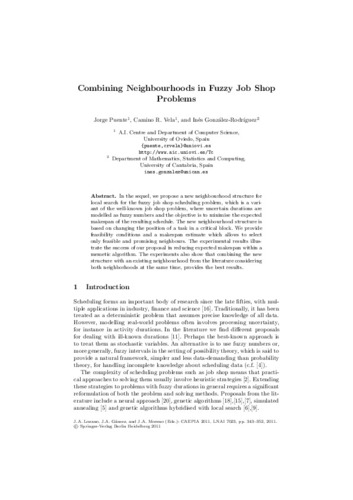Combining neighbourhoods in fuzzy job shop problems
Autor(es) y otros:
Fecha de publicación:
Editorial:
Springer
Versión del editor:
Citación:
Serie:
Lecture Notes in Computer Science;7023
Descripción física:
Resumen:
In the sequel, we propose a new neighbourhood structure for local search for the fuzzy job shop scheduling problem, which is a variant of the well-known job shop problem, where uncertain durations are modelled as fuzzy numbers and the objective is to minimise the expected makespan of the resulting schedule. The new neighbourhood structure is based on changing the position of a task in a critical block. We provide feasibility conditions and a makespan estimate which allows to select only feasible and promising neighbours. The experimental results illustrate the success of our proposal in reducing expected makespan within a memetic algorithm. The experiments also show that combining the new structure with an existing neighbourhood from the literature considering both neighborhoods at the same time, provides the best results
In the sequel, we propose a new neighbourhood structure for local search for the fuzzy job shop scheduling problem, which is a variant of the well-known job shop problem, where uncertain durations are modelled as fuzzy numbers and the objective is to minimise the expected makespan of the resulting schedule. The new neighbourhood structure is based on changing the position of a task in a critical block. We provide feasibility conditions and a makespan estimate which allows to select only feasible and promising neighbours. The experimental results illustrate the success of our proposal in reducing expected makespan within a memetic algorithm. The experiments also show that combining the new structure with an existing neighbourhood from the literature considering both neighborhoods at the same time, provides the best results
Descripción:
Conference of the Spanish Association for Artificial Intelligence, CAEPIA 2011(14th. 2011. La Laguna, Spain)
ISBN:
ISSN:
Identificador local:
20111662
Patrocinado por:
All authors are supported by MEC-FEDER Grant TIN2010-20976-C02-02
Colecciones
- Capítulos de libros [6535]
- Informática [875]
- Investigaciones y Documentos OpenAIRE [8420]
Ficheros en el ítem




